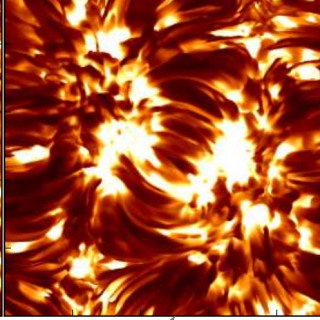Bibcode
Socas-Navarro, H.
Referencia bibliográfica
Astronomy and Astrophysics, Volume 577, id.A25, 8 pp.
Fecha de publicación:
5
2015
Revista
Número de citas
15
Número de citas referidas
13
Descripción
The oxygen abundance in the solar photosphere, and consequently the
solar metallicity itself, is still a controversial question with
far-reaching implications in many areas of astrophysics. This paper
presents a new determination obtained by fitting the forbidden O i line
at 6300 Å with an observational 3D model. The approach presented
here is novel because previous determinations were based either on 1D
empirical stratifications or on 3D theoretical models. The resulting
best-fit abundances are log ɛ(O) = 8.90 and log ɛ(Ni) =
6.15. Nevertheless, by introducing minor tweaks in the model and the
procedure, it is possible to retrieve very different values, even down
to log ɛ(O) = 8.70. This extreme sensitivity of the abundance to
possible systematic effects is not specific to this particular work, but
probably reflects the real uncertainty inherent to all abundance
determinations based on a prescribed model atmosphere.
As with the earlier version, the new 3D model is publicly available and
may be downloaded from the CDS via anonymous ftp to http://cdsarc.u-strasbg.fr
(ftp://130.79.128.5) or via http://cdsarc.u-strasbg.fr/viz-bin/qcat?J/A+A/577/A25
Proyectos relacionados

Magnetismo, Polarización y Transferencia Radiativa en Astrofísica
Los campos magnéticos están presentes en todos los plasmas astrofísicos y controlan la mayor parte de la variabilidad que se observa en el Universo a escalas temporales intermedias. Se encuentran en estrellas, a lo largo de todo el diagrama de Hertzsprung-Russell, en galaxias, e incluso quizás en el medio intergaláctico. La polarización de la luz
Ernest
Alsina Ballester